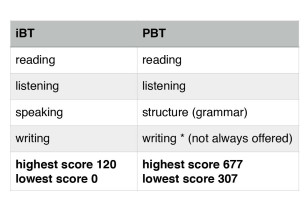 If you’re interested in studying at an American university, you’ve probably heard of the TOEFL. The Test of English as a Foreign Language is the most widely used language assessment test for American universities. The other major test is IELTS, which Dr. Jill will discuss in a future blog.
If you’re interested in studying at an American university, you’ve probably heard of the TOEFL. The Test of English as a Foreign Language is the most widely used language assessment test for American universities. The other major test is IELTS, which Dr. Jill will discuss in a future blog.
Many foreign students are terrified of the TOEFL because it is risky. A high TOEFL score will open many doors, while a low TOEFL score will limit your options for scholarships and admission to top schools. The most competitive universities generally expect an iBT score of 90 or above (out of 120). Others accept lower scores, and some do not require a score at all. Most universities do not publish a concrete cutoff score, but a high score will always be an advantage.
Which version should I take?
There are two major versions of the TOEFL test. The first is the iBT or Internet-based Test. It is offered in most of the world and accepted by nearly every university and scholarship program in the U.S.
The other version of the test is called the PBT or Paper-based Test. It is still used in some developing countries. Many scholarship programs, like AMINEF in Indonesia, will accept PBT results for the initial application, but may require students to take the iBT before official admission. The PBT is much cheaper to take and does not require Internet access. The PBT is also used internally by businesses and government ministries to test the English level of their employees.
 The iBT and PBT have very different formats. The main difference is that the iBT is completely online, includes a speaking section, and has integrated tasks (for example, listening, reading, and speaking are mixed together). The PBT has a structure (grammar) section while the iBT does not.
The iBT and PBT have very different formats. The main difference is that the iBT is completely online, includes a speaking section, and has integrated tasks (for example, listening, reading, and speaking are mixed together). The PBT has a structure (grammar) section while the iBT does not.
Look here to see which TOEFL is given in your country and to see prices. If you have a choice, take the iBT if you can afford it. The PBT will eventually disappear.
Tips for getting started with TOEFL
1. Plan ahead – It takes a long time to improve your TOEFL score. Many students “cram” or study just before the test. Raising your score will takes months of intensive study. Don’t expect a big lift in your score after two weeks. There’s no easy way to raise your score quickly. You will have to commit a lot of time and energy.
2. Master the basics first – Many students study for the TOEFL before they are ready. You should have at least an upper-intermediate English level before you attempt the test. If you score below 500 on the PBT or 70 on the iBT, review the fundamentals for a few months and come back to the TOEFL later.
3. Get a study guide – It’s easy to find study guides for the iBT. Pearson, Barron’s, ETS, and Kaplan all produce quality materials. Do a practice test once or twice a month. The best study guides will have explanations in the answer key. PBT study guides are difficult to find because the test is being phased out. Longman still produces guides for the PBT but you’ll need a CD ROM player. Locally produced PBT study materials available in Indonesia and Malaysia are usually of poor quality and should be avoided.
4. Use outside resources – Using TOEFL practice materials all the time will make you crazy. Remember, you are learning a language, not a test. You can improve your TOEFL score by making English part of your daily life—listening to podcasts, informal conversation with English speakers, watching movies and reading newspapers, reading English textbooks, texting in English, and writing online comments in English.
Here are some free resources for improving your TOEFL score by making English part of your daily life.
Listening
- VOA Learning English’s American Stories – These are adapted works of literature that provide rich vocabulary and good examples of English grammar.
- National Public Radio – this site has audio and scripts of news stories. They speak American English at normal speed, like they do in the TOEFL listening section. Download the podcasts and listen whenever you want. Advanced level.
- ESL Podcasts – A wide variety of podcasts can be found on iTunes and many other sites.
Reading
- VOA Voice of America English News – The site has stories from around the world with videos and graphics to help you understand stories. Upper intermediate level.
- USA Today – Read this accessible newspaper online. The site has lots of graphics to help you understand the stories. Upper intermediate level.
- The Washington Post – Read this American newspaper for free on the web or on your smart phone. Advanced level.
Speaking
- VOA Talk2Us – Practice your speaking with a VOA teacher on Skype.
- The Mixxer – Use this free website for language exchanges via Skype.
Writing
- Purdue Online Writing Lab – Check out this survival guide that American college students use for writing academic papers.
- Facebook messenger – Find English speakers on Facebook who want to trade texts with you.
- Online forums – Write comments in online forums, such as newspapers, and Facebook postings.
The bottom line is…
The way to do well on the TOEFL is to know English well. Don’t rely on tips or tricks. Don’t try to outwit the test maker. Think of reading, listening, speaking, writing, and grammar as a single connected concept–communication. The real goal of the test is to measure how well a potential student can communicate in English-speaking classroom. Immerse yourself in English on a daily basis and improvement is sure to follow.
Please post your questions in the comments section. I look forward to hearing from you!
Adam
 I grew up in Washington State (not Washington DC) USA and received my bachelor’s degree in print journalism. I have taught intensive English languages courses in Korea, Argentina, Indonesia, and the United States. After earning my master’s degree in English, I taught college writing courses at several universities. From 2012-2014, I was an English Language Fellow with the US Embassy in Jakarta, where I taught writing skills to Indonesian and ASEAN diplomats. Now I am working at Voice of America, where I produce multimedia content for English language learners.
I grew up in Washington State (not Washington DC) USA and received my bachelor’s degree in print journalism. I have taught intensive English languages courses in Korea, Argentina, Indonesia, and the United States. After earning my master’s degree in English, I taught college writing courses at several universities. From 2012-2014, I was an English Language Fellow with the US Embassy in Jakarta, where I taught writing skills to Indonesian and ASEAN diplomats. Now I am working at Voice of America, where I produce multimedia content for English language learners.
